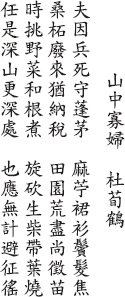224

Tu Hsun-ho (846–907) was from Shihtai, just south of the Yangtze port of Kueichih and the sacred mountain of Chiuhuashan, in whose foothills he spent most of his life studying for the civil service exams. When he finally passed at the age of forty-five, he was appointed to the Hanlin Academy under the patronage of the former warlord Chu Wen (852–912), whose political machinations also brought the T’ang dynasty to an end. Tu’s poetry, nearly all of which dates from before his success in the exams, is noteworthy for its focus on the distress of common people and the disorder of the times. It was common for the bereaved, after the death of a parent or spouse, to live in a thatched hut for up to three years and to wear rough hemp. Mulberry trees were used to feed silkworms. Taxes were imposed on land regardless of crop yields, and “seedling money” was often assessed by local officials and landlords when revenues fell short. Also, corvée—forced labor on government work projects—was calculated according to the number of males in a family.
A Mountain Widow
TU HSUN-HO
My husband died in battle my home is now a hut
my clothes are made of hemp my hair is like a broom
they keep collecting taxes on mulberry stumps
and still expect seedlings from overgrown fields
every day I forage for roots and plants to eat
or chop green wood and gather leaves to burn
even in the deepest depths of the mountains
there’s nowhere to go to escape corvée